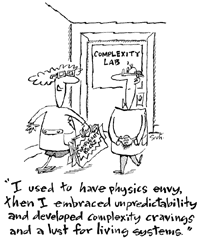
The questions asked by complexity scientists in the physical, natural and social sciences
are not little questions. They are deep questions about how life happens and how it
evolves. The questions are not new. Indeed, some of the 'answers' proposed by complexity
science are not new. But in many contexts, these 'answers' were not explainable by theory
. They were the intuitive responses that were known by many but appeared illogical or at
least idiosyncratic when viewed through out traditional scientific theories. Complexity
science provides the language, the metaphors, the conceptual frameworks, the models and
the theories which help make the  idiosyncrasies
non-idiosyncratic and the illogical logical. For some of the health care leaders who are
studying complexity, the science is counterintuitive because of the stark contrast with
what they had been taught about how organizations should operate. Complexity science
describes how systems actually behave rather than how they should behave.
idiosyncrasies
non-idiosyncratic and the illogical logical. For some of the health care leaders who are
studying complexity, the science is counterintuitive because of the stark contrast with
what they had been taught about how organizations should operate. Complexity science
describes how systems actually behave rather than how they should behave.
Complexity science provides more than just explanations for some of our intuitive
understandings. It also provides a rigorous approach to study some of the key dimensions
of organizational life. How does change happen? What are the conditions for innovation?
What allows some things to be sustained even when they are no longer viable? What creates
adaptability? What is leadership in systems where there is no direct authority or control?
"It is a curious thing... at least for me it has been. It is
both mind expanding because of new notions but it also seems like it is affirming of stuff
you already know. It is quite paradoxical." |
What does strategic planning mean in highly
turbulent times? How do creativity and potential get released? How do they get trapped?
Traditional management theories have focused on the predictable and controllable
dimensions of management. Although these dimensions are critical in organizations, they
provide only a partial explanation of the reality of organizations. Complexity science
invites us to examine the unpredictable, disorderly and unstable aspects of organizations.
Complexity complements our traditional understanding of organizations to provide us with a
more complete picture.
Bibliography
Waldrop:
Complexity
Lewin:
Complexity
That is the good news about complexity science. There is also some bad news. Complexity science is in its infancy. It is an emerging field of study. There are few proven theories in the field. It has not yet stood the test of time. But it has become a movement. Unlike some other movements in the management arena, the complexity science movement spans almost every discipline in the physical, natural and social sciences. There is often a huge schism between those who study the world using quantitative approaches and those who use qualitative methods.
"Out of nothing, nature makes something. How do you make something from
nothing? Although nature knows this trick, we haven't learned much just by watching...
[Life's] reign of constant evolution, perpetual novelty, and an agenda out of our
control... is far more rewarding than a world of clocks, gears, and predictable
simplicity." |
Complexity has created a bridge or a merger of quantitative and qualitative explanations of life. It has attracted some of the greatest thinkers in the world including some of the most highly respected organization theorists and Nobel prize winners in physics, mathematics and economics. It has also attracted poets, artists and theologians who see the optimism implicit in the science. By examining how life happens from a complexity perspective, we seem to have increased our reverence for life - the more we understand, the more we are amazed.
Next | Previous
| Return to Contents List
All Components of Edgeware Primer Copyright© 2000, Brenda J. Zimmerman.
Schulich School of Business, York University, Toronto, Canada.
Permission to copy for educational purposes only. All other rights reserved